
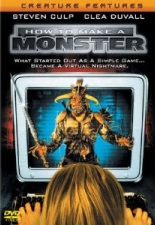 In 1994, writer/director George Huang turned his experience working as an executive assistant in Hollywood into the excellent dark comedy Swimming With Sharks, and it seemed like he was well on his way to bigger and better things. Unfortunately, his teen comedy follow-up, Trojan War, went straight to video, and it was all he could do to get a gig remaking a 1958 AIP flick for Showtime’s short-lived Creature Features film series.
In 1994, writer/director George Huang turned his experience working as an executive assistant in Hollywood into the excellent dark comedy Swimming With Sharks, and it seemed like he was well on his way to bigger and better things. Unfortunately, his teen comedy follow-up, Trojan War, went straight to video, and it was all he could do to get a gig remaking a 1958 AIP flick for Showtime’s short-lived Creature Features film series.
Assigned with How to Make a Monster, he completely jettisoned the original’s plot, instead telling the tale of a group of video game programmers who end up being stalked by their own virtual monster.
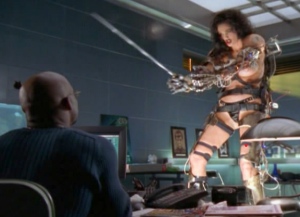 Deliberately cartoony, the movie makes no attempt at all to depict the authentic realities of game production, which wouldn’t be a problem if Huang hadn’t decided to rip himself off and use the film to re-tell the same story he told in his first and much, much, much better picture. By the time Monster ends with a newly jaded Clea DuVall (in the Frank Whaley role) schooling a new intern in the cold, cruel realities of the world, it becomes agonizingly clear that by his third film, Huang had already shot his entire creative wad, leaving him with nothing else to say.
Deliberately cartoony, the movie makes no attempt at all to depict the authentic realities of game production, which wouldn’t be a problem if Huang hadn’t decided to rip himself off and use the film to re-tell the same story he told in his first and much, much, much better picture. By the time Monster ends with a newly jaded Clea DuVall (in the Frank Whaley role) schooling a new intern in the cold, cruel realities of the world, it becomes agonizingly clear that by his third film, Huang had already shot his entire creative wad, leaving him with nothing else to say.
That said, the movie isn’t a complete waste of time, assuming you’re a fan of B-movie bombshell Julie Strain, who gifts the picture with a completely gratuitous nude scene (that you can probably find somewhere online). —Allan Mott

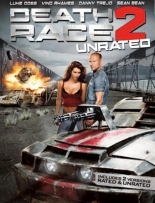
 How did that metal-masked Frankenstein become Frankenstein? Where’d he get that modified Ford Mustang? How did the high-octane event even start? Did they find Joan Allen through LinkedIn or something? Odds are, you weren’t even asking such things at the end of 2008’s
How did that metal-masked Frankenstein become Frankenstein? Where’d he get that modified Ford Mustang? How did the high-octane event even start? Did they find Joan Allen through LinkedIn or something? Odds are, you weren’t even asking such things at the end of 2008’s  She proposes “a race: wicked, epic,” which begets the Death Race we all know and love. One of its instant superstars is Terminal Island’s newest residents, Carl Lucas (Luke Goss of
She proposes “a race: wicked, epic,” which begets the Death Race we all know and love. One of its instant superstars is Terminal Island’s newest residents, Carl Lucas (Luke Goss of 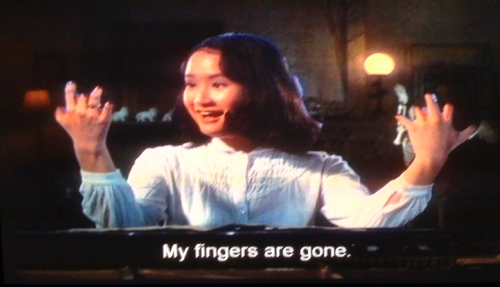

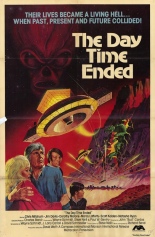
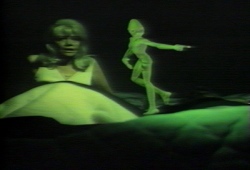 Then there’s a poorly matted spaceship that chases them through the house, and ultimately, as the title promises, time ends. Or rather, the family just gets warped into the future, on the outskirts of the city of tomorrow, and for some reason, this suits them just fine.
Then there’s a poorly matted spaceship that chases them through the house, and ultimately, as the title promises, time ends. Or rather, the family just gets warped into the future, on the outskirts of the city of tomorrow, and for some reason, this suits them just fine. 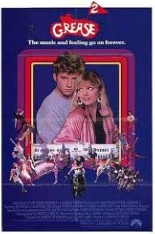
 I’ve spent far too much time trying to come up with reasons why I enjoy
I’ve spent far too much time trying to come up with reasons why I enjoy 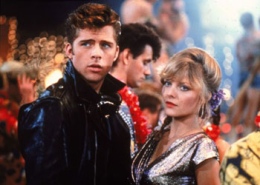 The film itself isn’t that much different than the first one, except in Grease 2, the innocent foreign exchange student is a dude (Caulfield) and the tough-but-sexy greaser is a chick (Pfeiffer). Like his cousin Sandy, Caulfield decides he has to slut it up to get the romantic attention he desires, so he buys a motorcycle and some tight leather clothes. Getting in his way is Zmed, Pfeiffer’s ex-boyfriend and current leader of the T-Birds.
The film itself isn’t that much different than the first one, except in Grease 2, the innocent foreign exchange student is a dude (Caulfield) and the tough-but-sexy greaser is a chick (Pfeiffer). Like his cousin Sandy, Caulfield decides he has to slut it up to get the romantic attention he desires, so he buys a motorcycle and some tight leather clothes. Getting in his way is Zmed, Pfeiffer’s ex-boyfriend and current leader of the T-Birds.